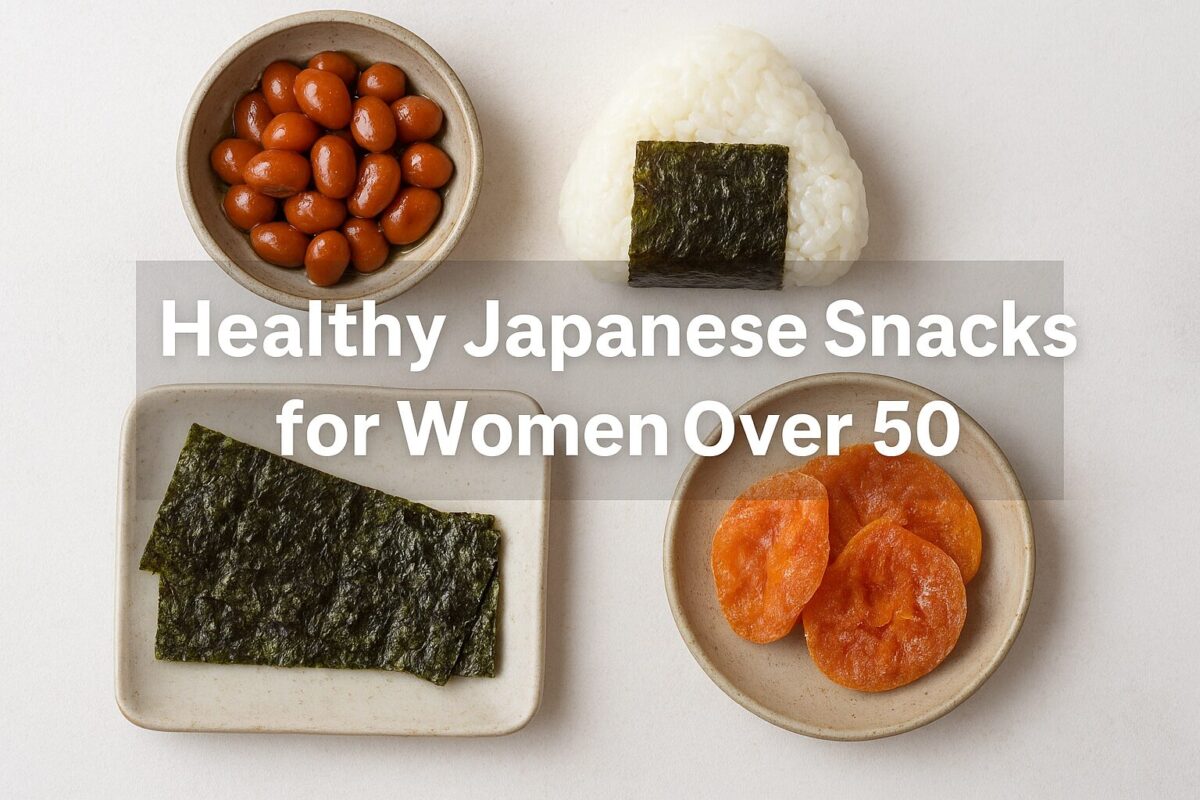As women enter their 50s, nutrition becomes increasingly important for maintaining energy, managing weight, and supporting long-term health. Hormonal changes, slower metabolism, and bone density concerns make choosing the right foods even more essential. While snacking often gets a bad reputation, incorporating wholesome, balanced snacks into your daily routine can be a smart way to fuel your body and avoid overeating at mealtimes. Japanese food culture, with its emphasis on natural, minimally processed ingredients, offers excellent options for guilt-free snacking.
This article explores healthy Japanese snacks for women over 50—such as simmered beans, roasted seaweed, rice balls, and dried persimmons—that are both delicious and nourishing.
Why Healthy Snacking Matters After 50
The Role of Nutrition in Midlife
As women age, estrogen levels decline, which can contribute to bone loss, weight gain, and increased risk of chronic diseases. Smart snack choices rich in protein, fiber, and micronutrients can help counter these changes.
Japanese Philosophy of Snacking
Unlike Western habits that often involve processed, high-sugar treats, Japanese snacks are typically lighter, plant-based, and nutrient-dense. This makes them ideal for maintaining balance and avoiding the blood sugar spikes that lead to fatigue and cravings.
For more insights on healthy eating after 50, visit National Institute on Aging.
Nimame (Simmered Beans): Protein and Fiber Powerhouse
Why Beans Are Beneficial
Simmered beans, or nimame, are a traditional Japanese snack made by cooking soybeans, black beans, or red beans with a touch of soy sauce and sugar. They provide plant-based protein, fiber, and essential minerals like iron and magnesium.
Bone and Heart Health
Beans are especially valuable for women over 50, as they support heart health, regulate blood sugar, and provide nutrients essential for strong bones. The isoflavones in soybeans may also help ease menopausal symptoms.
Easy to Incorporate
Enjoy a small dish of nimame as a mid-afternoon snack or pair them with rice for a light meal. Their naturally sweet and savory flavor makes them satisfying without being heavy.
Yaki Nori (Roasted Seaweed): Light and Mineral-Rich
Nutrient Benefits
Yaki nori, or roasted seaweed sheets, are a staple of Japanese cuisine. They are low in calories but rich in iodine, calcium, magnesium, and antioxidants.
Supporting Thyroid and Bone Health
The iodine in seaweed supports healthy thyroid function, which is crucial for metabolism. Its calcium and magnesium content also contribute to bone strength—an important consideration for postmenopausal women.
A Crunchy Alternative to Chips
Roasted seaweed offers a light, crispy texture, making it a great alternative to processed snack foods. You can eat it on its own, wrap it around rice, or crumble it over salads and soups.
For more about seaweed nutrition, see Harvard T.H. Chan School of Public Health.
Onigiri (Rice Balls): Balanced and Portable
Why Rice Balls Work as Snacks
Onigiri are rice balls often filled with ingredients like salmon, pickled plum (umeboshi), or seaweed. They provide complex carbohydrates for sustained energy and can be customized with nutrient-rich fillings.
Benefits for Women Over 50
Whole grains, including brown rice, are an excellent source of fiber, which supports digestion and heart health. Onigiri’s versatility allows for protein-rich fillings that help stabilize blood sugar.
Convenient and Satisfying
Onigiri are portable, easy to prepare, and portion-controlled, making them perfect for busy women who want a healthy snack at work or on the go.
Hoshigaki (Dried Persimmons): Naturally Sweet and Nutrient-Dense
A Traditional Japanese Treat
Hoshigaki, or dried persimmons, are a naturally sweet snack enjoyed in Japan for centuries. They are rich in fiber, potassium, and antioxidants.
Supporting Digestive and Heart Health
The fiber in dried persimmons aids digestion and promotes satiety, while potassium helps regulate blood pressure. Their antioxidants also protect against age-related cellular damage.
A Guilt-Free Sweet Snack
Unlike processed desserts, hoshigaki are free from added sugars and artificial ingredients. They make a satisfying option when you crave something sweet without the guilt.
For more on the benefits of dried fruits, visit Cleveland Clinic.
Practical Tips for Guilt-Free Snacking
Portion Control
Even healthy snacks can contribute to weight gain if portions are too large. Aim for small servings that provide energy without excess calories.
Pairing Snacks with Other Foods
Combine snacks with complementary foods for better balance—for example, pair nimame with green tea or enjoy roasted seaweed with a small onigiri.
Embracing the Japanese Approach
Japanese snacking culture emphasizes moderation, simplicity, and enjoyment. By adopting this mindset, women over 50 can nourish their bodies while still finding pleasure in food.
Conclusion
Healthy Japanese snacks like nimame, yaki nori, onigiri, and hoshigaki provide nutrient-dense, guilt-free options for women over 50. Packed with protein, fiber, vitamins, and minerals, these traditional foods not only satisfy cravings but also support bone health, heart function, and overall vitality. By integrating these snacks into your daily routine, you can embrace both nourishment and enjoyment, all while promoting long-term wellness.
The natural bone strength complex made from Satsuma mandarin orange
Juveriente®’s Bone Strength Complex provides you the above all 3 essential nutrients for bone health along with a Japanese bone health support food extract.
That main functional ingredient is simply an extract of a Japanese popular citrus fruit!! Needless to say, it is better to try a natural food before jumping to strong medicines. Though natural and gentle, it has garnered a lot of amazing reviews in Amazon since its launching in 2016.
If you like to try multi-vitamin supplement, how about adding the natural bone therapy fruit extract with Juveriente® Bone Strength Complex?
Please learn details in our product page.









